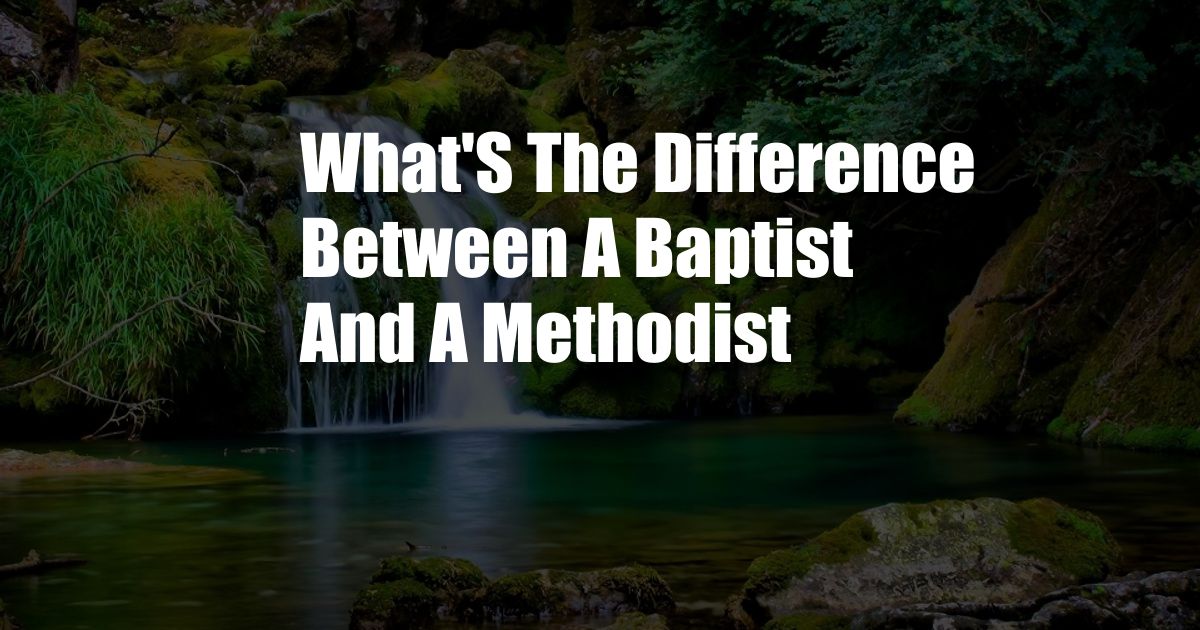
A Comparative Exploration of Baptist and Methodist Beliefs
My first encounter with the Baptist and Methodist denominations left me grappling with their similarities and differences. As I delved deeper, I discovered a fascinating tapestry of theological nuances and historical distinctions. In this article, we will embark on a comprehensive journey, unraveling the intricate differences between these two esteemed branches of Christianity.
Beyond the Shared Roots: Baptists and Methodists through History
Baptists and Methodists trace their origins back to the Protestant Reformation of the 16th century. Both denominations emerged from a desire for a more personal and authentic relationship with God, breaking away from established religious institutions. However, as they developed, they embraced distinct theological perspectives and practices.
One significant difference lies in their understanding of baptism. Baptists believe in believer’s baptism, administered only to those who consciously profess faith in Christ. Methodists, on the other hand, practice infant baptism, seeing it as a sign of God’s covenant with his people.
Doctrine and Polity: Unraveling the Distinct Beliefs
Baptists adhere to the principle of congregational autonomy, where each local church governs itself. They emphasize the authority of Scripture and believe in the priesthood of all believers, where every member has equal access to God.
Methodists, on the contrary, have a more hierarchical structure, with ordained ministers overseeing multiple churches within a district. They emphasize the importance of tradition and the writings of church leaders in addition to Scripture.
Regarding salvation, Baptists hold to the doctrine of election, believing that God has predestined some individuals to salvation. Methodists, while acknowledging God’s sovereignty, emphasize the importance of free will and human responsibility in salvation.
Theological Nuances: A Deeper Dive into Beliefs
Baptists typically subscribe to Calvinist theology, emphasizing God’s sovereignty and the depravity of humanity. They believe that salvation is solely by God’s grace and that only those elected by him will be saved.
Methodists, on the other hand, follow Wesleyan theology, which stresses the importance of personal experience and sanctification. They believe that God’s grace is available to all and that individuals can grow in holiness through the power of the Holy Spirit.
Contemporary Trends and Developments: The Evolving Landscape
Both Baptist and Methodist denominations have experienced significant changes in recent decades. Baptists have witnessed a resurgence of conservative theology and a movement towards megachurches. Methodists have been engaged in conversations about the ordination of women and LGBTQ+ inclusion, leading to some divisions within the denomination.
Social media and online platforms have become important tools for both denominations to connect with younger generations and share their messages. They actively engage in interfaith dialogues and social justice initiatives, seeking to be relevant to the challenges of the 21st century.
Tips and Expert Advice for Navigating the Differences
As we navigate the differences between Baptists and Methodists, consider these expert tips:
- Seek Unity Amidst Diversity: Recognize that both denominations share a common Christian faith, despite their doctrinal variations.
- Embrace Respectful Dialogue: Engage in meaningful conversations with individuals from different denominations, fostering mutual understanding and appreciation.
- Focus on Shared Values: Emphasize common ground such as the love of God, the importance of Scripture, and the pursuit of holiness.
- Prioritize Collaboration: Explore opportunities for совместное сотрудничество on issues of mutual interest, such as community outreach or social justice initiatives.
Frequently Asked Questions: Clarifying Common Queries
Q: Are Baptists and Methodists considered Protestant?
A: Yes, both Baptists and Methodists are Protestant denominations, having emerged from the Protestant Reformation.
Q: Which denomination has more members worldwide?
A: Baptists are generally considered the larger denomination, with an estimated global membership of over 100 million.
Q: Do Baptists and Methodists celebrate Communion differently?
A: Baptists typically practice closed Communion, allowing only baptized believers to participate, while Methodists practice open Communion, welcoming all baptized Christians.
Conclusion: A Call to Continued Dialogue
As we conclude our exploration, let us appreciate the rich diversity of Christian denominations and the shared desire for a closer relationship with God. By understanding the differences between Baptists and Methodists, we can foster greater appreciation, unity, and collaboration within the Christian community.
Do you find this article informative and helpful in understanding the differences between Baptists and Methodists? Share your thoughts and continue the conversation in the comments below.